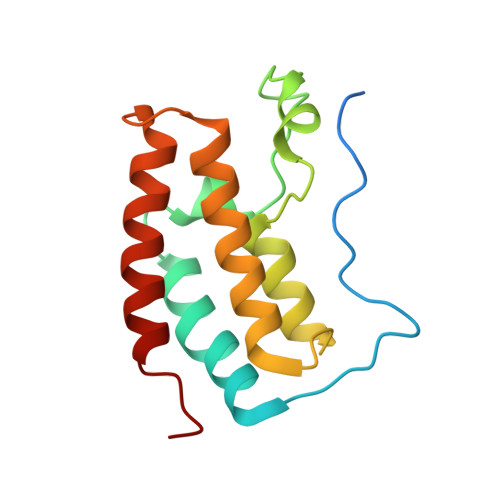Benzoxazinone-containing 3,5-dimethylisoxazole derivatives as BET bromodomain inhibitors for treatment of castration-resistant prostate cancer.
Xue, X., Zhang, Y., Wang, C., Zhang, M., Xiang, Q., Wang, J., Wang, A., Li, C., Zhang, C., Zou, L., Wang, R., Wu, S., Lu, Y., Chen, H., Ding, K., Li, G., Xu, Y.(2018) Eur J Med Chem 152: 542-559
- PubMed: 29758518
- DOI: https://doi.org/10.1016/j.ejmech.2018.04.034
- Primary Citation of Related Structures:
5YQX - PubMed Abstract:
The bromodomain and extra-terminal proteins (BET) have emerged as promising therapeutic targets for the treatment of castration-resistant prostate cancer (CRPC). We report the design, synthesis and evaluation of a new series of benzoxazinone-containing 3,5-dimethylisoxazole derivatives as selective BET inhibitors. One of the new compounds, (R)-12 (Y02234), binds to BRD4(1) with a K d value of 110 nM and blocks bromodomain and acetyl lysine interactions with an IC 50 value of 100 nM. It also exhibits selectivity for BET over non-BET bromodomain proteins and demonstrates reasonable anti-proliferation and colony formation inhibition effect in prostate cancer cell lines such as 22Rv1 and C4-2B. The BRD4 inhibitor (R)-12 also significantly suppresses the expression of ERG, Myc and AR target gene PSA at the mRNA level in prostate cancer cells. Treatment with (R)-12 significantly suppresses the tumor growth of prostate cancer (TGI = 70%) in a 22Rv1-derived xenograft model. These data suggest that compound (R)-12 is a promising lead compound for the development of a new class of therapeutics for the treatment of CRPC.
- Guangdong Provincial Key Laboratory of Biocomputing, Joint School of Life Sciences, Guangzhou Institutes of Biomedicine and Health, Chinese Academy of Sciences, Guangzhou 510530, Guangzhou Medical University, Guangzhou 511436 China; University of Chinese Academy of Sciences, No. 19 Yuquan Road, Beijing 100049, China.
Organizational Affiliation:



















